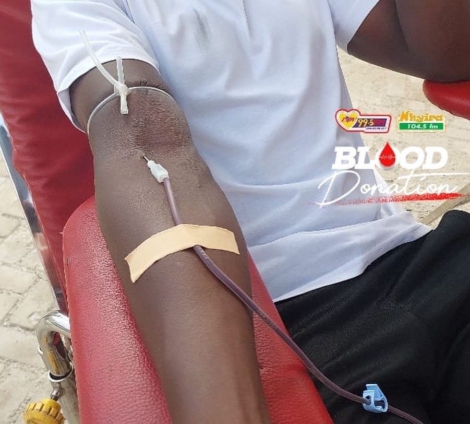A Medical Laboratory Scientist in Charge of the Blood Bank at the International Maritime Hospital (IMaH) in Tema, has urged Ghanaians to be honest when answering questions before they donate blood.
Ms. Doris Kusima Baiden explained that potential donors of blood were expected to answer a confidential questionnaire about their medical history before blood donation.
This is to give the health attendant a good idea of your general health and blood condition and foster a better service for donors and recipients.
Ms. Baiden was addressing issues related to blood donation at the weekly “Your Health! Our Collective Responsibility!" initiative by the Ghana News Agency aimed at promoting health-related communication and providing a platform for health information dissemination to influence personal health choices through improved health literacy
Ms. Baiden, supported by Mr. Robert Tetteh Djimajor, also a IMaH Medical Laboratory Scientist, explained that, as a routine before blood donation “we first take personal details like your name, age, date of birth, address, and other contacts. We then further proceed to ask confidential health questions.”
Ms. Baiden emphasised that donors were expected to come clean about medications taken in recent times, current health status, specific sexual activities, and other lifestyles.
“These questions are very confidential and help safeguard your own health and the health of the person receiving the blood. We only want to ensure that one is fully fit physically, mentally, and emotionally before donating blood,” she said.
She said that it is very important to be truthful because infections like HIV, Hepatitis B and C, and Syphilis could be transmitted by transfusion to a patient receiving blood.
She revealed that donating blood did not only benefit the receiver, but it also gave donors the chance to be offered a brief medical examination that included checking the temperature and pulse, blood pressure, ensuring minimum weight, and haemoglobin level.
“As a blood bank, it is our responsibility to ensure that all the blood coming in is safe for use and does not contribute to the loss of lives in the hospital. Saving lives is a collective responsibility, and all must endeavour to rightly go through the safe and secured procedures to donate blood,” she said.
Latest Stories
-
DAMC, Free Food Company, to distribute 10,000 packs of food to street kids
18 minutes -
Kwame Boafo Akuffo: Court ruling on re-collation flawed
38 minutes -
Samuel Yaw Adusei: The strategist behind NDC’s electoral security in Ashanti region
40 minutes -
I’m confident posterity will judge my performance well – Akufo-Addo
52 minutes -
Syria’s minorities seek security as country charts new future
2 hours -
Prof. Nana Aba Appiah Amfo re-appointed as Vice-Chancellor of the University of Ghana
2 hours -
German police probe market attack security and warnings
2 hours -
Grief and anger in Magdeburg after Christmas market attack
2 hours -
Baltasar Coin becomes first Ghanaian meme coin to hit DEX Screener at $100K market cap
3 hours -
EC blames re-collation of disputed results on widespread lawlessness by party supporters
3 hours -
Top 20 Ghanaian songs released in 2024
3 hours -
Beating Messi’s Inter Miami to MLS Cup feels amazing – Joseph Paintsil
3 hours -
NDC administration will reverse all ‘last-minute’ gov’t employee promotions – Asiedu Nketiah
4 hours -
Kudus sights ‘authority and kingship’ for elephant stool celebration
4 hours -
We’ll embrace cutting-edge technologies to address emerging healthcare needs – Prof. Antwi-Kusi
4 hours

